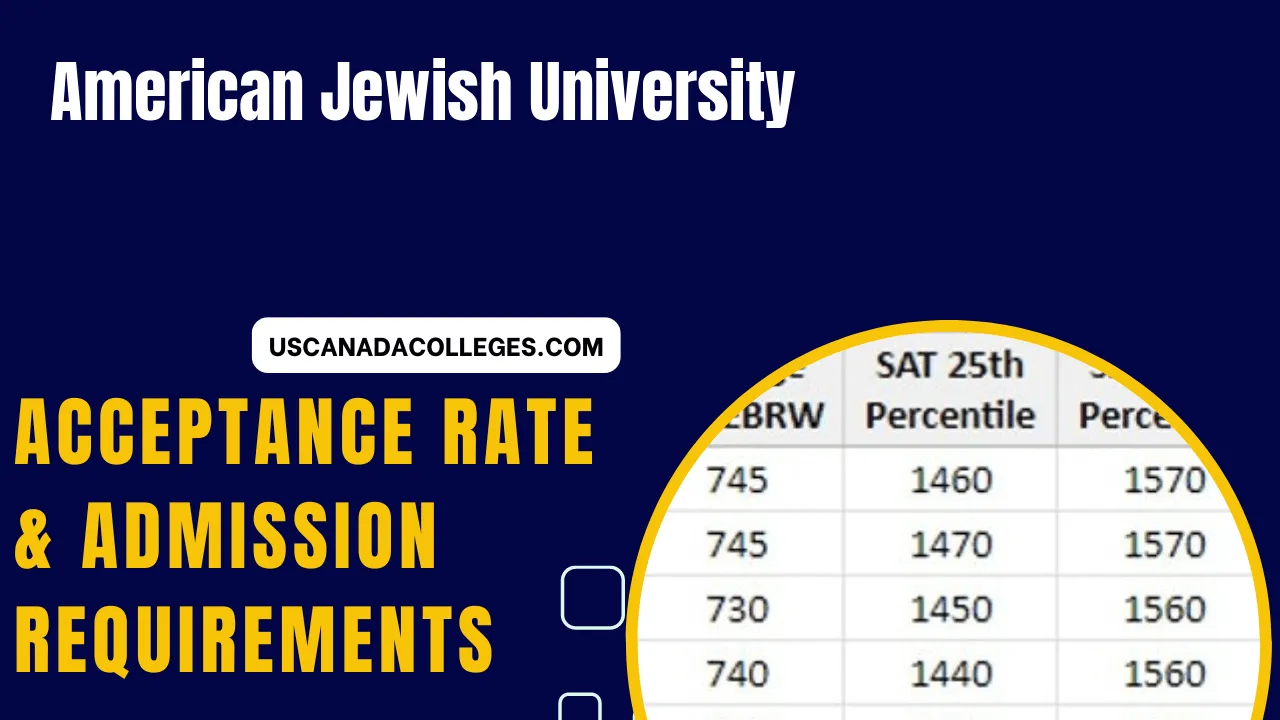The acceptance rate of American Jewish University is not reported. The admission process at American Jewish University (AJU) is not very strict. Most institutions whose acceptance rate is not reported do not have a high acceptance rate. Hence, we may assume that American Jewish University's admission criteria are not very strict. However, this does not mean that every applicant will be admitted.
To secure admission to American Jewish University, perform well in academics and other activities. Meeting American Jewish University (AJU)'s GPA and standardized test (SAT/ACT) requirements is crucial, as failing to do so may prevent your application from moving forward. Additionally, a well-written letter of recommendation, your participation in co-curricular and extracurricular activities, and your interpersonal communication skills can improve your chances of admission.
American Jewish University Admission Requirements
Can I Get Into AJU Without SAT Or ACT?: The admission test score (SAT/ACT) policy for American Jewish University is unknown. But it is better to submit the test score if you have performed well in the test. It gives an extra opportunity to showcase your skills and competencies and hence will improve your chances of admission. Check the schedule of the test and plan accordingly. It is advisable to appear multiple times in the test unless you score well above the average SAT / ACT score of the admitted students, as given below. Normally, students may appear in the test 4 to 5 times to improve their scores. But if your score is not up to the mark and is less than the national or state average, then it is better not to submit the score as it will impact negatively.
American Jewish University (AJU) SAT Requirements
Each school has different requirements for SAT and ACT testing. Only a few schools require the SAT or ACT, but many consider your scores if you choose to submit them. The test score policy is already mentioned.
AJU Profile
Name: American Jewish University (AJU)
City: Los Angeles
URL: www.aju.edu/
State: California
Type: Non-Profit Private
Zip: 90077-1519
Campus: Main
Accredited by: Western Association of Schools and Colleges Senior Colleges and University Commission (WASCSR)
How can I get a scholarship?
8.33% of the students are receiving Pell Grant and 8.33 percent are receiving Federal Grants. So it is a better choice to go to AJU and apply for PELL or federal loan grants.
At American Jewish University, you will have no problem receiving any scholarship from the federal government. Fill in the FAFSA application form at the earliest and enlist AJU as your choice in the form.
How much a AJU Graduate make?
The average annual salary of the AJU graduate after 4-6 years of graduation is USD 61954. An average AJU graduate makes this much after 10 years of enrollment (4-6 years after graduation).
The average annual income of a graduate in the United States is USD: 40595
Degree Programs
Bachelor Degree Programs
- Bioethics/Medical Ethics
- Biological and Biomedical Sciences
- Business Administration, Management and Operations
- Business, Management, Marketing, and Related Support Services
- Business/Commerce, General
- Communication and Media Studies
- Film/Video and Photographic Arts
- Liberal Arts and Sciences, General Studies and Humanities
- Literature
- Political Science and Government
Frequently Asked Questions About American Jewish University Admissions
Answer: Graduates of this university typically earn a moderate salary, $61954 annually, with some fluctuation based on the field.
Question: What are my chances of getting a scholarship at American Jewish University?
Answer: Your chances of getting a scholarship are lower, 50% or less. It's important to apply early and showcase a strong academic profile.
Question: Is it possible to transfer to American Jewish University from another university?
Answer: Yes, many students successfully transfer to American Jewish University each year. Be prepared with your academic transcripts, recommendation letters, and a solid personal statement to make your application competitive.
Question: What is the campus culture like at American Jewish University?
Answer: The campus culture at American Jewish University is diverse and vibrant, with numerous student organizations, sports teams, and cultural activities. It’s an ideal environment for personal growth and building lifelong connections.
Question: How can I improve my chances of getting into American Jewish University?
Answer: To improve your chances, focus on excelling academically, building a strong extracurricular profile, and submitting standout essays. High SAT/ACT scores are also crucial for competitive admissions.
Full list of All degree programs offered by American Jewish University.
Data on this page is sourced from IPEDS, College Scorecard's latest data as provided in 2025, US Department of Education's latest 2025 statistics, Institute's official websites and printed material as well as additional publicly available sources.
